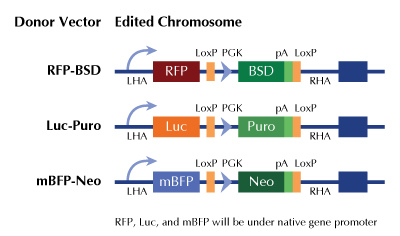FGF2 Human Gene Knockout Kit (CRISPR)
CAT#: KN217426RB
FGF2 - human gene knockout kit via CRISPR, HDR mediated
Functional Cassette: GFP-puro Luciferase-Puro mBFP-Neo
HDR-mediated knockout kit validation
USD 1,657.00
4 Weeks*
Specifications
| Product Data | |
| Format | 2 gRNA vectors, 1 RFP-BSD donor, 1 scramble control |
| Donor DNA | RFP-BSD |
| Symbol | FGF2 |
| Locus ID | 2247 |
| Components |
KN217426G1, FGF2 gRNA vector 1 in pCas-Guide CRISPR vector KN217426G2, FGF2 gRNA vector 2 in pCas-Guide CRISPR vector KN217426RBD, donor DNA containing left and right homologous arms and RFP-BSD functional cassette. GE100003, scramble sequence in pCas-Guide vector |
| Disclaimer | These products are manufactured and supplied by OriGene under license from ERS. The kit is designed based on the best knowledge of CRISPR technology. The system has been functionally validated for knocking-in the cassette downstream the native promoter. The efficiency of the knock-out varies due to the nature of the biology and the complexity of the experimental process. |
| Reference Data | |
| RefSeq | NM_002006, NM_001361665 |
| UniProt ID | P09038 |
| Synonyms | BFGF; FGF-2; FGFB; HBGF-2 |
| Summary | The protein encoded by this gene is a member of the fibroblast growth factor (FGF) family. FGF family members bind heparin and possess broad mitogenic and angiogenic activities. This protein has been implicated in diverse biological processes, such as limb and nervous system development, wound healing, and tumor growth. The mRNA for this gene contains multiple polyadenylation sites, and is alternatively translated from non-AUG (CUG) and AUG initiation codons, resulting in five different isoforms with distinct properties. The CUG-initiated isoforms are localized in the nucleus and are responsible for the intracrine effect, whereas, the AUG-initiated form is mostly cytosolic and is responsible for the paracrine and autocrine effects of this FGF. [provided by RefSeq, Jul 2008] |
Documents
| Product Manuals |
| FAQs |
| SDS |
Resources
Other Versions
| SKU | Description | Size | Price |
|---|---|---|---|
| KN217426 | FGF2 - human gene knockout kit via CRISPR, HDR mediated |
USD 1,657.00 |
|
| KN217426BN | FGF2 - human gene knockout kit via CRISPR, HDR mediated |
USD 1,657.00 |
|
| KN217426LP | FGF2 - human gene knockout kit via CRISPR, HDR mediated |
USD 1,657.00 |
|
| KN417426 | FGF2 - KN2.0, Human gene knockout kit via CRISPR, non-homology mediated. |
USD 1,657.00 |
|
| GA101570 | FGF2 CRISPRa kit - CRISPR gene activation of human fibroblast growth factor 2 |
USD 1,657.00 |
{0} Product Review(s)
Be the first one to submit a review






























































































































































































































































 Germany
Germany
 Japan
Japan
 United Kingdom
United Kingdom
 China
China
